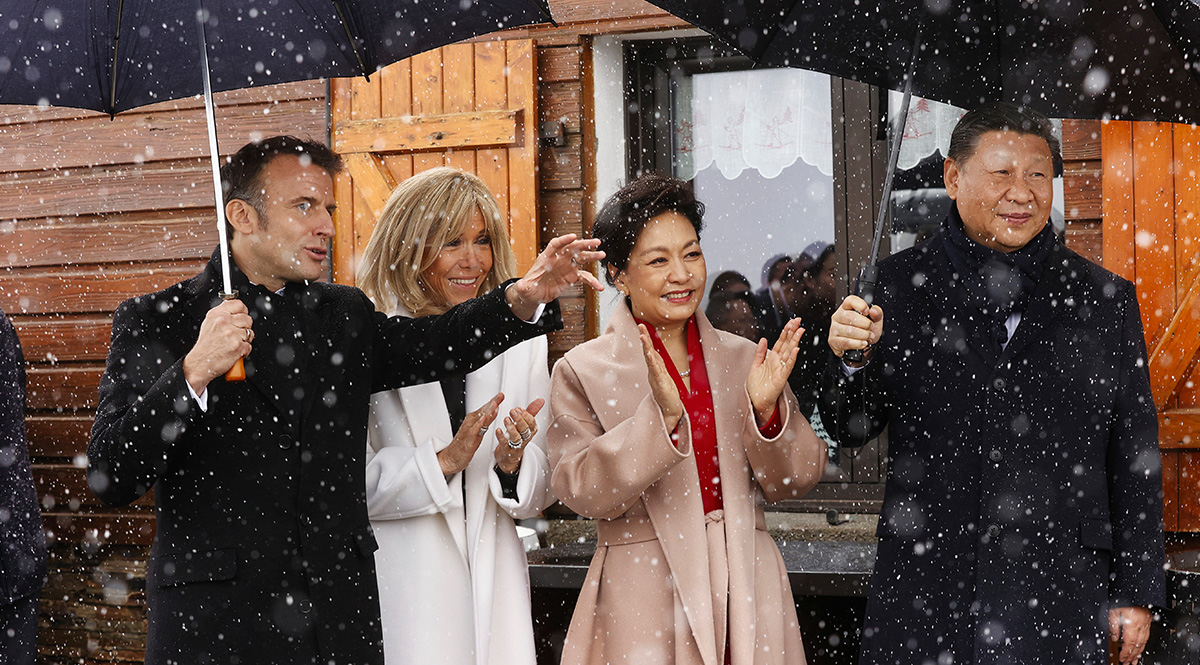Xi Jinping Attempts to Undermine EU-U.S. Cooperation During State Visit to France
During President Xi Jinping’s visit to France on 5-7 May, China confirmed its aim to undermine the EU’s policy of reducing dependence on China (derisking). This visit was also significant in supporting French rhetoric about European sovereignty, which China perceives as limiting transatlantic cooperation. This is also one of the goals of China’s cooperation with Russia. President Emmanuel Macron reported that Xi had declared that China would not sell arms to Russia and that exports of dual-use goods to Russia would be closely monitored. However, the Chinese did not confirm this statement.
 Pool/ABACA / Abaca Press / Forum
Pool/ABACA / Abaca Press / Forum
What were the circumstances surrounding the visit?
Recently, the EU has been speeding up the derisking process in its relations with China. The European Commission, under pressure from France, is taking further measures against subsidised Chinese companies, particularly those in the electromobility industry. In April, German Chancellor Olaf Scholz visited China and reaffirmed Germany’s willingness to continue cooperation with Chinese entities, while also being cautious about reducing risk. Ahead of the visit by Chinese President Xi, both the German Chancellor and French president expressed their concerns about Chinese support for Russia, which is seen as an obstacle to improving relations between China and the EU. However, Macron also emphasised EU self-reliance, including in the context of supporting U.S. policy towards China, in his speech on the future of Europe in April. Before the bilateral talks with Xi, Macron invited Ursula von der Leyen, the president of the European Commission, to demonstrate support for the EU’s position towards China, but also for her to present the contentious issues in EU-China relations, thereby allowing the French leader to strengthen bilateral relations.
What were Xi Jinping’s objectives?
China considers France to be a significant partner in its policy towards the EU, particularly after Germany declared its willingness to increase cooperation during a visit to China in April. The later visit aimed to present France with an attractive economic offer and convince President Macron to postpone derisking measures. Moreover, it was crucial for Xi to stress cooperation with France on global matters and weaken transatlantic ties. In an article published in Le Figaro before the visit, the Chinese leader referred to France’s pivotal role in the EU and on the international stage. While taking a conciliatory approach in the text, he hoped for the development of bilateral economic cooperation, such as the import of Chinese electric cars and their production in France. Additionally, political cooperation was mentioned, including in the assessment of the situation in the Middle East.
What were Macron’s goals?
One of the French president’s objectives regarding China is to achieve a more balanced trade relationship between France, the EU, and China. This includes gaining increased access to the Chinese market for French exports. France aims to reduce its trade deficit with China, which stood at €46.2 billion in 2023. To achieve this goal, among other things, France seeks to open the Chinese market to meat and dairy exports. However, Chinese anti-dumping procedures against the European spirits drinks sector are threatening French cognac producers. This action by China is in retaliation for protectionist measures in the electromobility market. Macron hopes to increase Chinese investment in France. The economy minister has confirmed that France is open to all industrial projects, including in the automotive sector, such as with the Chinese company BYD. Furthermore, Macron considers China an important partner in the sphere of security and the fight against climate change. As part of his increased commitment to help Ukraine, he was keen to get Xi to use his influence as an ally of Russia to take action to end the war, including in the context of Vladimir Putin’s announced visit to China in May.
What did the leaders agree on?
Representatives from France and China issued four joint statements on their cooperation in agriculture, biodiversity and oceans, artificial intelligence, and the management of related global challenges, as well as the situation in the Middle East. They also announced that China will expand access to its market for French poultry and pork products, while the two countries will increase cooperation in the wine industry. During the visit, 18 contracts and agreements were signed between French and Chinese companies, particularly in the aviation, transport, energy, and financial sectors. However, the agreements are not expected to be a significant breakthrough in strengthening bilateral economic relations, and Xi did not offer major concessions in terms of access to the Chinese market. The talks between the parties regarding a large order for Airbus aircraft preceding the visit did not lead to the signing of a contract. French President Emmanuel Macron highlighted Xi Jinping’s open stance on French cognac imports, as well as the suspension of China’s additional tariffs. The two sides also pledged to intensify exchanges on how to improve access to the Chinese market for cosmetic products, as sought by French producers, who addressed the issue of intellectual property rights violations in China.
What has been achieved on the war in Ukraine and the conflict in the Middle East?
The talks brought no change in China’s approach to the war in Ukraine. Xi countered the EU’s criticism of China for its close relations with Russia, saying the EU was using the “crisis” (as the Chinese call Russian aggression) to blame a third country and damage its image. However, Macron noted that Xi had pledged not to sell arms to Russia and to tighten controls on dual-use exports. This could reinforce France’s desire to maintain diplomatic channels with China over Ukraine. However, similar wording was not included in the Chinese communiqué. Therefore, the veracity of these declarations will need to be verified, and China may make greater use of third country intermediaries, such as North Korea, when supplying Russia. The two leaders also addressed the situation in the Middle East. In a joint declaration, they expressed their opposition to the Israeli offensive on the town of Rafah in the Gaza Strip. They pointed to the urgent need for an immediate and permanent ceasefire and the implementation of a two-state solution on the 1967 borders. They also supported a return to the concept of a nuclear agreement with Iran. Additionally, they called for the restoration of free passage in the Red Sea and the Gulf of Aden. However, they did not directly identify the authors of the attacks on civilian ships in these waters. The statement on the Middle East confirms France’s negative assessment of Israel’s military action in Gaza.
What impact will the visit have on EU-China relations?
France has shown interest in strengthening its cooperation with China in the economic sphere, as indicated by the number of agreements signed and France’s economy minister statements regarding cooperation with China. However, this willingness may hinder the pace and scope of derisking, particularly as the EU undergoes a process of institutional change related to the European Parliament elections. The criticism expressed during the meeting with Xi by the EC president (who is likely to run for this position again) on Chinese overproduction and support for Russia (resulting in the possible inclusion of Chinese companies in subsequent EU sanctions packages), combined with the announcement of the continuation of the policy of reducing dependence, partially balanced France’s desire to strengthen economic relations with China. Despite this, Macron’s approach to the EU’s China policy so far suggests that France will support the implementation of derisking by the next EC in order to enhance the opportunities for French companies in competition with China.




.jpg)
.jpg)
